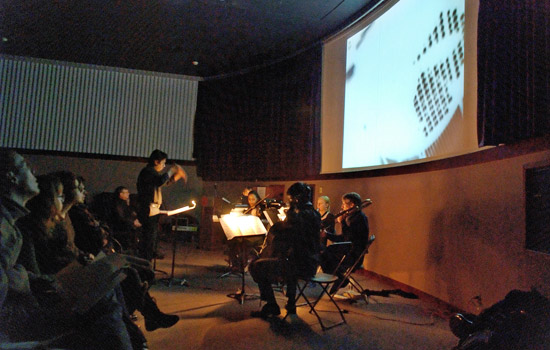Eastman School of Music Combines ‘Old Films and New Music’ at RIT April 25
Show curated using 1920s and 1930s films from the archive at George Eastman House
Gerry Szymanski
The “Old Films and New Music” program will take place at noon April 25 in RIT’s Ingle Auditorium.
The silent-film era provided moviegoers with the experience of experimental film combined with a live orchestra. Eastman School of Music composers and musicians will bring this experience back to life in conjunction with seven films from the archive of the George Eastman House. The program “Old Films and New Music” debuted in Berlin in January, hosted by the Kurt Weill Festival.
Eastman School of Music composers Michaela Eremiáöová and Jairo Duarte-López wrote the scores to the 1920s films of Bauhaus master and avant-garde artist László Moholy-Nagy, silhouette animator Lotte Reiniger and documentary film director Walter Ruttmann. The performance is at noon April 25 in Ingle Auditorium at Rochester Institute of Technology. It is free and open to the public.
“Today’s encounter of young composers with old films essentially repeats what was attempted back in the 1920s,” says Reinhild Steingröver, associate professor of German at the Eastman School and curator of the program.
Accompanying the films will be musicians Anna Brumbaugh (clarinet), Anyango Yarbo Davenport (violin), Andreas Ioannides (piano), Jonathan Lo (cello) and Rick McRae (trombone). Duarte-López serves as the conductor.
Reiniger’s animated films kick off the program, including her first film, Ornament of the Love-Struck Heart (1919), in which a girl and a young man are entwined by lianas while playing with a floating heart, only to finally melt into each other in an embrace.
Most of the program is dedicated to Moholy-Nagy, known for his wide spectrum of work, ranging from his aesthetically demanding social report to abstract experimental films. The films are Impressions of the Old Port in Marseille (1929), Light-Play Black, White, Grey (1930), Urban Gypsies (1932) and Berlin Still Life (1932), in which he is interested in the graphic elements of documentary’s images.
Ruttmann’s film The Victor (1922) is also featured.
“This spectacular program includes new music scores that support and travel with the ideas and images these important early films convey,” says Stephanie Maxwell, RIT professor in the School of Film and Animation. “We invite people to come spend their lunch break enjoying this beautiful performance.”
For more information on the event, contact Maxwell at sampph@rit.edu.









